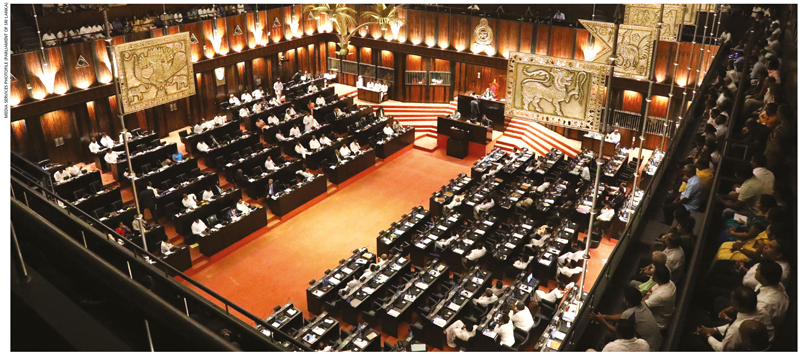STATE OF THE NATION
A HIGH NATIONAL COST FOR POLITICAL UNITY
Wijith DeChickera laments pragmatic coalition politics that keeps strange bedfellows yoked in a marriage of convenience while the national interest faces a divorce
A president using his executive powers to prorogue parliament is a little like an unpopular CEO locking the boardroom to pre-empt fellow directors from ganging up against him. It is an unscrupulous but often successful ploy.
The last instance of great import (admittedly a subjective interpretation) when parliament was prorogued was during ex-president Ranasinghe Premadasa’s struggle to stymie an internal coup in the UNP. That the presidential ploy succeeded while the usurpers’ plot failed says less for executive vision than valorous reform.
By the time you read this, parliamentary proceedings would have recommenced a month or so ago. So the ground may have shifted quite a bit since sullen or jubilant MPs traipsed back into the house to conduct ‘business as usual’– militating for personal privileges amidst their pretence of national service.
Whatever transpired in the interim between prorogation and recommencement, it is the aftermath of surviving no confidence motions and redressing the household balance of power that will set the tone for a rocky relationship between the executive and legislature. A continuing spat between a president and his coalition partners exacerbates national instability.
The prorogation was embraced by a triad of critiques. Some such as the JVP decried it on the grounds that the suspension of parliamentary sittings for party political reasons denied the country an opportunity to debate and decide on matters vital to the people’s interests such as the proposed 20th Amendment to the Constitution being mooted at the time. Others – like the UNP, which played it safe – dismissed the criticism by endorsing prorogation as being in the best traditions of the legislature.
A few approved of it on the premise it would bring stability.
That prorogation would buy the president precious time to parley was not in doubt. However much a slap in the face of coalition politics was the rebellion of the 16 SLFP MPs who voted against a perceptibly unpopular PM, there was time to salvage some standing room for government to continue. Cabinet appointments, which kicked in less than a fortnight after the prorogation, are proof of the pragmatic pudding that’s been in the baking for a triad of years since the great putsch of 2015.
RESULT Pity good governance went ‘pfft’ into the bargain! Hope abounds for Guinness political records. Only a field marshal being denied the law and order baton means under anyone else’s ministry, the mandarins of the previous regime are safe until needed in a presidential endgame.
There is an increasingly sickening sense that the stability of government comes at an unacceptably high cost. For one, the price tag of the sweeteners (perhaps mitigated to some extent by heavy-handed fiscal reforms to suit a coalition’s longevity?).
Then there’s the nonchalant entitlement that many MPs are not ashamed to air in public, not being grieved by their egregious grumbling, that perks have bypassed their party’s backbenchers in the hurly burly of realpolitik. Cabinet is not a cloister of clever Dicks.
Rather than bemoan the retardation of the transitional justice agenda, these partisan Jeremiahs have opted to lament the short end of the stick they seem to have received. For every crocodile tear shed by politicos that coalition politics has short-changed them or their party and its principles, there’s the clink of a coin signifying an opportunity cost for the national interest.
And last but by no means least, the cost of justice being delayed to satiate vested interests.
REALITY There is a lost passion as regards the reforms agenda. Would-be future statesmen languish on the sidelines with no shekels for state coffers to invest in transforming a bedlam polity into a nation state.
Blame for this execrable syndrome must be shouldered by would-be present statesmen playing petty or partisan politics to further personal agendas without (it seems) a thought or care for any future except their own longevity in power.
Reportage or Hansard betrays the sense of entitlement that elected representatives of every political hue seem to feel these days. Hope in the coalition of coalitions to end an oppressive regime and turn the tide of democracy has dwindled to a trickle of false hope, sundered promises, shocking betrayals and lamentable inaction.
Even the ‘come, let us build!’ rallying call of a UNP led development oriented government is no longer the reassuring clarion for corporate Sri Lanka to steady its ship upon.
The prime minister manages at best to stir up apathy wherever he goes with his blasé “in time, some progress will bear fruit” mantra – less than inspiring. The less said about the president’s shenanigans to stay on top of power the better. Even less about the Hun at the Gate still at large.
RAMIFICATION Sri Lanka has a triple bottom line power structure. Present prez, PM, previous war hero.
Nothing succeeds like excess, and a rapidly burgeoning cabinet only underlines the stark reality that a singular political culture prevails to the detriment of the people and their precious national resources. That is the managed spectacle of a soured political marriage presenting a united front until the next polls: neither here nor there.
Which is to say that it’s alarmingly like the state of politics today.





